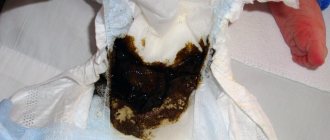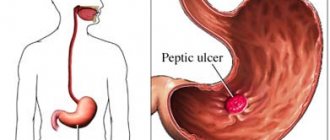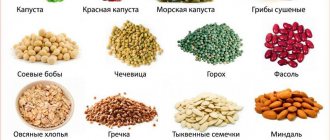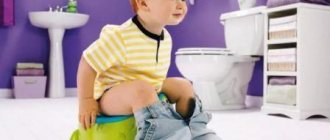What can mucus in stool mean?
Mucus in the stool is a reason to consult a doctor
The appearance of mucus in a child’s stool may indicate the following:
- Breast milk is not sterile. If a mother is breastfeeding her baby and he has diarrhea with mucus, then first of all it is necessary to check him for sterility. If doctors find something, they will prescribe a course of treatment, after which everything should return to normal.
- Cow's milk intolerance, also called lactase intolerance
- If a woman is breastfeeding, it means that her diet contains allergens that cause mucus to appear.
- The child began to be introduced to complementary foods, mainly vegetable purees, and the intestines gradually adapt to them and get used to them
- There are problems with the intestines, which you can definitely find out about by getting tested
- The child has a little cold
- The mucus present in a child’s stool does not always indicate that there are serious problems.
- Most often, this is simply a reaction of the immune system and intestines to new foods.
Errors in nutrition
The color of the stool depends on the feeding of the baby.
It is the mother who makes mistakes in choosing a diet for both her own and her baby. Only in formula-fed children is the pediatrician responsible for the wrong choice of formula.
Read: Green stool in a 1 year old child: how dangerous is it and what to do?
But even in this case, the doctor cannot predict how the baby’s body will accept the proposed replacement of mother’s milk. In this case, the mother should also be attentive and if any negative reactions occur, contact the pediatrician.
Currently, it is recommended to use mixtures containing probiotics. They allow you to improve the process of nutrition absorption.
If the baby eats mother’s milk, then the woman should pay more attention to her own diet and adjust it. Mucus inclusions appear in toddlers if the mother eats high-calorie foods - full-fat milk, nuts - and allergenic foods - chocolate, citrus fruits, strawberries.
During the lactation period, especially in the first months, you should adhere to the principles of a healthy diet. New foods should be introduced gradually, observing the baby's reaction.
Another common mistake is a violation of the ratio of foremilk and hindmilk. The first fraction is more liquid. It is rich in proteins and lactose and functions as a drink. Hind milk is fattier. Therefore, to normalize the toddler’s feces, the duration of feeding should be from 15 to 20 minutes.
After the introduction of complementary foods, the appearance of mucus indicates that the product has not been fully absorbed. If there is not much of it, then you should not immediately cancel vegetables or fruits. Only a violent negative reaction from the body is a reason to wait with the introduction of complementary foods.
Causes of mucus
There is almost always mucus in a child's stool, but the amount is so small that it is not even noticeable. But when there is a lot of it, it is a sign of developing problems with the intestines, namely a signal that the body is fighting an infection. There are several reasons why mucus may appear in a baby’s stool:
- Cold. It would seem how a cold can affect the intestines. But often in children this is a defensive reaction; moreover, the amount of mucus will be small and it will not cause concern.
- Taking medications that can have a negative effect on the child’s intestinal mucosa. These include antibiotics, since horses kill all the beneficial bacteria in the intestines, and it becomes vulnerable
- An intestinal infection, during which, in addition to mucus in the stool, many other dangerous symptoms appear. In addition, a large amount of mucus indicates a strong process of fighting infection, since the intestines are protected as best they can. Depending on what kind of infection has penetrated the intestines, the nature of the mucus secretions, as well as its color and smell, will depend.
- Rotavirus infection, during which the child experiences general malaise and a small amount of mucus
- Parasites that gradually destroy the mucous membrane, forcing it to defend itself
- Thrush, or as it is also called, candidiasis Autoimmune origin of infections in the intestines
- Colitis
- Inflammation of the rectum
- Inflammation of the intestinal wall
- Dysbacteriosis, especially periods of exacerbation, when there is more mucus and stool becomes thinner
- Breast-feeding. Of course, this is a rare cause of mucus in the stool, but it does occur
Read: JVP - four types of pathology and principles of a therapeutic diet
One of the most dangerous reasons for the appearance of mucus in a child’s stool is an intestinal infection, since during it many symptoms appear that lead to a significant deterioration in the child’s condition, as well as to dehydration. It is known that if a child loses even a small amount of water, it can be fatal.
Infectious diseases
Mucus in stool can be a sign of an infectious disease. But this is not the only sign of pathology. Symptoms of the infectious process:
- pain and colic in the abdomen;
- restlessness and crying of the baby;
- bloating;
- foul-smelling or foamy stool;
- mucus impurities in large quantities, blood during bowel movements;
- diarrhea;
- temperature increase.
This situation requires urgent contact with a medical facility. The cause of infection may be failure to comply with the rules of hygiene and handling of the baby's dishes. In addition, a child can receive pathogenic flora from a mother diagnosed with mastitis.
Therefore, in case of inflammatory or purulent processes in the mammary gland, the advisability of continuing breastfeeding should be discussed with a doctor.
Diarrhea with mucus
Diarrhea with mucus is a cause for concern
Particular attention should be paid to the moment when a child experiences diarrhea with mucus. This is the main symptom of dysbiosis, which appears mainly after taking strong antibiotics that have completely killed the beneficial intestinal microflora. To find out for sure whether a child has dysbiosis, it is necessary to undergo special stool tests, which will show the content of beneficial and harmful bacteria. It is not uncommon when there are practically no beneficial bacteria, and it is during this period that the child begins to experience diarrhea with mucus, which is sometimes accompanied by sharp pains in the stomach. After the pain subsides, the child goes to the toilet.
In most cases, the urge to defecate appears literally ten minutes after eating, and the child will strain as if the stool is not liquid, but very hard.
It must be said right away that you should not be afraid of dysbiosis, since it can be controlled with the help of prebiotics, which will help restore the intestinal microflora and improve your general condition. In addition, the inclusion of fermented milk products in the diet will also have a positive effect and affect the rate of intestinal recovery. If we talk about medications, then if diarrhea with mucus appears, it is necessary to give the child Smecta. It is an excellent absorbent and removes all harmful substances, and also helps strengthen the stool. The dosage depends on the age of the baby.
Read: Gall bladder with a bend in the neck: features of the disease, treatment
If, in parallel with Smecta, the doctor prescribed some other drugs for the treatment of dysbiosis, then they should be given strictly two hours after taking Smecta, since the drug can simply be eliminated without starting to act. If diarrhea with mucus is repeated many times, and the child is small enough, it is better to call an ambulance or go to see a pediatrician, who will recommend medications that can help alleviate the child’s condition.
White slime
Mucus in stool looks like this...
One of the most common phenomena is white mucus in a child’s stool. It is very easy to notice, as it immediately stands out in color. If a mother finds this in her baby’s stool, the reason may be:
- Inflammation of the intestinal wall, which has led to the deposition of epithelial cells
- Taking medications whose main side effect is dysbacteriosis
- Poor nutrition, namely the presence of allergens in food that cause inflammation of the intestinal walls
- Intolerance to milk, namely cow's milk. Today, more and more often, parents buy their children either goat’s milk or special food made from goat’s milk.
- Parasites that have entered the intestines. Small children constantly put their hands in their mouths, and also take other people's toys and lick them, thereby collecting all the pathogenic bacteria and microbes that they can
If such mucus is found in the stool, you should urgently consult a doctor, as the baby’s condition will worsen every day.
He becomes capricious, constantly cries, refuses even his favorite food, does not want to play, and most importantly, complains of stomach pain. But if the baby is less than a year old, then there is no need to delay and try to treat him yourself. It is better to call an ambulance and go straight to the hospital. Where the child’s normal condition will be restored very quickly and appropriate treatment will be provided.
Read: What should be the diet after gallbladder removal surgery?
Lactase deficiency
With lactase deficiency, colic is observed.
This condition is characterized by a decrease in the enzymatic activity of lactase in the intestine. This pathology can occur in a latent form and overtly.
There are congenital and acquired forms of the disease. Babies with lactase deficiency develop the following symptoms:
- pain and colic, flatulence;
- baby cries after feeding;
- frequent bowel movements;
- the character of the stool is foamy, fetid, the smell is sour;
- developmental delay of the baby.
In this case, the doctor will order a stool test for carbohydrates. And based on the results, he will suggest a treatment option. Therapy begins with the mother if the baby is breastfed.
The goal is to reduce the amount of carbohydrates in milk and add lactase preparations during feeding. For artificial people, a specialized mixture is selected.
In this case, the amount of carbohydrates is monitored every week.
When to call an ambulance
Although the mucus may disappear on its own or go away over time, there are cases when it is necessary to urgently call an ambulance:
- If diarrhea with mucus is simultaneously accompanied by severe and incessant vomiting
- Body temperature has increased significantly
- There is blood in the stool
- The child poops more than twelve times a day, and loosely
- If the child is not gaining weight well, namely the increase is less than 125 grams per month
- Bad breath
- Urinating about 6 times a day, and the smell of urine is unpleasant
If the following symptoms are detected, it is best to call an emergency room so as not to delay the process for too long and to prevent complications from developing.
What to do if mucus appears in the stool
Often, if there is mucus in the stool, the child behaves calmly
Many parents wonder what to do if their child suddenly has mucus in his stool. First of all, you need to pay attention to whether this is a one-time phenomenon or a permanent one. If such feces have happened once or twice, and the child behaves as usual (plays, indulges), then there is no reason to panic.
But if a child goes to the toilet often, and there is no feces as such, but only mucus, you need to give the child Pancreatin, Smecta. Sometimes a doctor may prescribe either Enterol or Enterofuril.
Mucus in a child’s stool is a fairly common occurrence; the main thing is to react to it correctly and not start to panic. If, nevertheless, the mother is more worried than always, then it is better to play it safe and call a doctor or an ambulance.
The following video will tell you how dangerous diarrhea and other digestive disorders are for a child:
https://www.youtube.com/watch?v=J00Wr4eDHAI
Read along with this article:
- Mucus in the stool of a baby. Dysbacteriosis and mucus in the stool
- There is a lot of mucus in the baby’s stool: what does the symptom mean, why...
- Stool with mucus is a cause for concern
- Greenish stool: main causes in children and adults
- Why does my baby poop mucus? Should we panic?
- If there is blood in the stool: causes in children and adults
- Dysbacteriosis in infants, symptoms, causes, treatment
- Green poop in a baby: causes, methods...
- What causes white mucus to appear in stool? Should we panic?
Dysbacteriosis
Dysbacteriosis is a disorder of the intestinal microflora.
Dysbacteriosis is a disturbance in the composition of the intestinal microflora.
The causes of this condition are aggressive treatment, taking antibiotics, and violation of the diet of a nursing woman. Signs of this condition:
- defecation disorder;
- flatulence, colic;
- regurgitation of milk;
- the appearance of mucus in the stool.
An analysis of the baby's feces will confirm this diagnosis. Often this condition does not require treatment. The doctor will prescribe a complex of probiotics and drugs to improve digestion. In mild cases, it is enough for the mother to reconsider her diet. And for bottle-fed toddlers, change to an adapted milk formula.
Read: Green feces in an adult, basic information, causes of the condition, diagnosis and treatment










